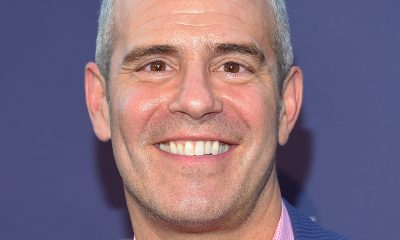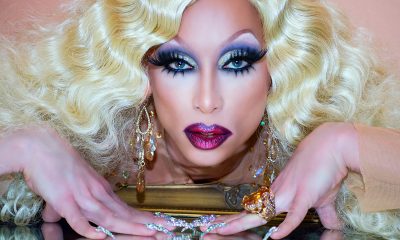a&e features
Sandra Bernhard on ‘Pose,’ ‘Drag Race,’ the ‘Roseanne’ reboot and more
Stand-up legend dishes freely in advance of Pride week D.C. appearance
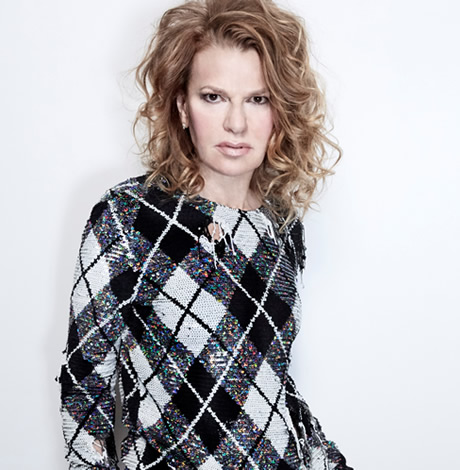
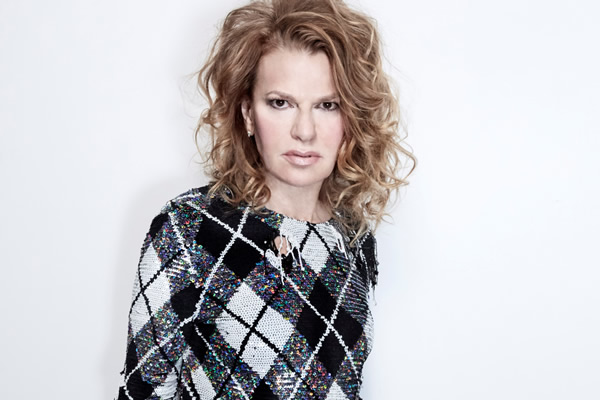
SANDRA BERNHARD says finding a new stylist nearly two years ago was ‘a game changer.’ (Photo by Jordan Graham)
Washington Blade presents: Sandra Bernhard ‘Sandemonium’
Shakespeare Theatre Company
Harman Center for the Arts
Friday, June 8
7:30 p.m.
$59-99
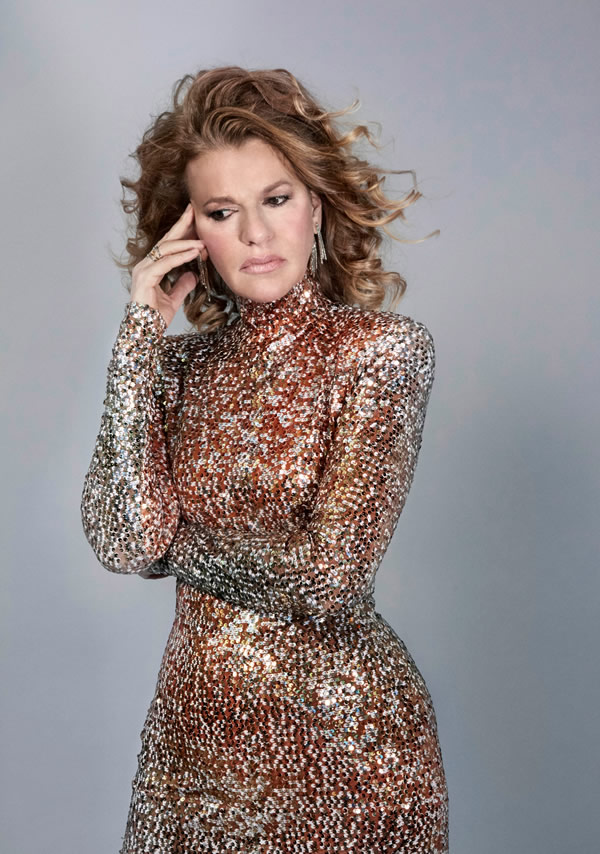
SANDRA BERNHARD says she’s always intrigued by the juxtaposition of life in Washington. (Photo by Jordan Graham)
These are dark days and Sandra Bernhard knows it.
“Are you gender neutral? Come face to face with a white supremacist? Swam through a flood? Run from a fire? Observed a chunk of the polar ice cap floating away? …,” the promos for her show “Sandemonium” read.
If so, well, Sandy is here to help.
She returns to Washington next week with a performance presented by the Washington Blade at Shakespeare Theatre Company. She spoke to the Blade by phone May 18 from her home in New York City. Her comments have been slightly edited for length.
WASHINGTON BLADE: You were just in D.C. recently, weren’t you?
SANDRA BERNHARD: Exactly a week ago, actually.
BLADE: Where did you play?
BERNHARD: I was at the City Winery, a new venue and it was fantastic. It was packed and the audience was terrific. We had a great time. I hadn’t been to D.C. in a while and now I’m excited to come back again. I’ll be doing a lot of different material than I did at the City Winery. All the songs will be different and there’ll be a lot of material I didn’t do at City Winery plus a few little gay Pride surprises.
BLADE: This is your show “Sandemonium,” right?
BERNHARD: Well, that’s just a title, you know. I put a new show together every year at Joe’s Pub so I always have a new title, but essentially I’m always writing new material because of doing my (Sirius XM radio) show “Sandyland” every day, I’m constantly curating new material so it’s nice to keep things really fresh and there’ll be some of that and some newer stuff too. It’s always a work in progress.
BLADE: Are you always listening for songs you’d like to cover or do you keep a list or what?
BERNHARD: Kind of a little bit of both because a lot of times I’ll think my set list is all signed, sealed and delivered and then Mitch Caplan, who’s my musical director, we’ve been collaborating for years, he always laughs because literally a day before I’ll be doing a new show, I’ll find a completely different opening song or a totally different closing song because sometimes the spirit just moves me and then I’m trying to find the absolute right thing that really works so I’m always open to something new even if it’s just an hour before the show.
BLADE: You seem really jaded in your standup at times but yet in interviews you sometimes seem rather joyous and upbeat. Is that just naturally your personality? Is it hard to balance the two extremes?
BERNHARD: It depends on the situation. What’s fun about doing “Sandyland” is I’ve been able to tap into more of my positive side, you know, I think that part of my personality, I just think it registers better on radio and I’ll talk about what’s happening politically or gun violence or things that have a lot of emotion around them. But then day to day, I think I’ve been able to access that part of my personality that people have started coming to day in and day out, so it’s a surprise for me and it’s been a great self discovery.
BLADE: How did your radio show come about?
BERNHARD: I’ve been friendly with Andy Cohen for years and about three years ago, he put his channel Radio Andy together and we had lunch and he said, “I have this idea, I don’t know if you’d be into it, but I’ll be doing this channel on Sirius, I’d love for you to do this show.” I said, “Yeah, that sounds perfect,” because I kind of needed a platform and it’s harder and harder to get a talk show quote-unquote off the ground and they usually just don’t work and radio, especially Sirius, has this sense of freedom that you can’t find anywhere. Never once has anybody walked into my studio and said, “No, don’t say that, don’t do that.” Nobody cares. They just let you do whatever you want because after all, it is home to Howard Stern. How can you be more obnoxious or outrageous than Howard Stern? … It’s just been really cool.
BLADE: What’s the hardest part of doing your stage show that the average person wouldn’t ever think about?
BERNHARD: Well, behind the scenes, there’s just always the logistics. You know, like who’s going to the be the person to get your from point A to point B. I have a few different people who work with me in terms of tour manager and I don’t really go out on the road like Stevie Nicks or some big rock band. I do two or three dates a month and sometimes I’m off the road for two months doing other stuff. … It’s sort of a semi-well-oiled machine but sometimes gig to gig it takes a little more or less effort to make sure it goes smoothly.
BLADE: Speaking of Stevie Nicks, what was it like at the (April, 1998) concert for the “Stormy Weather” album? When you’re doing something like that, are the super A-listers like her, Joni Mitchell and so on, are they polite but kind of stand-offish or what?
BERNHARD: Well I’ve known all those ladies for years and I’ve been really lucky in the course of my career to get to be friendly with a lot of people in the music business. Chrissie Hynde is one of my best friends. I’m friends with Debbie Harry, Belinda Carlisle is one of my best friends and I don’t mean to name drop, but you know, music was really my first love. I wanted to be just a singer and I kind of got sidetracked into comedy and I have no regrets because I think the combination of both has been really very fulfilling for me and fun for the audience. But I know Stevie, I know Joni, I know all those people and you know, I don’t always get to see all of them all the time, but in that setting, of course, I’m a little bit intimidated because they’re the best at what they do. I consider myself a decent singer and pretty decent musical person but, you know, I always defer to those people. But they’re always totally supportive and lovely and most people think I have a pretty good voice, so I take that as a nice compliment obviously.
BLADE: Is there anybody of that ilk who is privately much different from their public persona? Maybe somebody who’s actually raunchy or shy or something we’d never guess?
BERNHARD: (laughs) No, nobody’s really raunchy. I think Belinda Carlisle is probably one of the most humble and shy people and so is Debbie Harry. Everybody who is really, really good, they play down what they do in their day-to-day life and almost all of them do something that is very grounding and they’re involved with a lot of different social causes so I don’t know — I just think people who are really talented are usually very complex and interesting and not full of themselves.
BLADE: Was it kind of trippy and surreal to see the “Roseanne” set so faithfully recreated for the reboot?
BERNHARD: Um, yes it was and yet also in a way not because it just sort of felt like, well, it’s not that shocking that it happened again because it was so iconic and it’s been on the air every single day since it went off the air, you know, officially. It’s been in rotation for 20 years so I think it was different than it would have been if it was a show we hadn’t seen at all in 30 or 40 years, then it would have been more weird. So it was and it wasn’t.
BLADE: Does it feel much different on the set this time?
BERNHARD: It feels a little different. There’s new kids and new writers but generally speaking, you know, Laurie Metcalf and all the main people, John Goodman, it has that continuity so it didn’t feel that much different. I think people have all evolved a lot emotionally and spiritually so I think things are a little more relaxed than they were maybe early on.
BLADE: What’s Roseanne like between takes? Is she high strung or kind of chill?
BERNHARD: She’s pretty chill. She gets tired out pretty easily you know. She’s not like a hard-charging person so I think sometimes she just needs to like, escape and regroup a little and she’ll kind of keep to herself, but you know, when she’s around, she’s friendly, she’s nice to everybody.
BLADE: How did you first hear of the reboot and are you going to be in more of it or do you know yet?
BERNHARD: Well, I sort of read about it like everybody else to be perfectly honest with you. And then I reached out to Sara Gilbert who was sort or rebooting the whole project and then I didn’t hear back from her for quite a while and then all of a sudden out of the clear blue, I did hear back from her and that’s sort of when it all came together for the last episode. It was the last episode they shot, even though it just aired a couple weeks ago. I’m sure they’ll have me back at least one or two more times during the next go-around, but they haven’t committed to anything yet. (Bernhard’s Blade interview occurred prior to the news this week that the “Roseanne” reboot was cancelled.)
BLADE: Now that it’s had a long time to sink in, what impact do you think your (lesbian/bi) storyline and the kiss and all that had culturally? Do you think it reached more people because of “Roseanne’s” demographic?
BERNHARD: Yeah, I think it reached everybody because the average weekly viewership of the show in its prime was 15-20 million … so I think it had a huge impact and opened the doors for a lot of different conversations about sexuality and, you know, certainly it’s gone to places nobody could have imagined and that’s a cool thing.
BLADE: Does Roseanne’s Trump support bother you, either on the show or in real life?
BERNHARD: I’m not happy about it. I think if it was strictly Roseanne the character, it would have been understandable but even then, not really because Roseanne and Dan were always liberals and he was a union guy and so none of it really makes sense at all and I think when they come back, I think it’s probably less political. I just read an article and the president of ABC, who’s a woman of color, she was saying, “No, it’s not gonna be this way next time around.” Because what’s the point of it? I mean, oh, to show people that Muslims are people too? Do we really need that primer in 2018? Really? I would hope people are smart enough and open enough to know that there are people in every path of life that are good and bad. I mean, how many more conversations do we need to have about this shit? I just don’t think it really resonates to me and I don’t think it resonates with anybody because I would hope people are intelligent enough to figure that out on their own.
BLADE: I heard Carol Burnett say recently that shows take way longer to tape than they did back in the ’60s and ‘70s. She was saying on her show, it was zip-zip-zip, they’d be done in a few hours and go home, now it’s like a 10-hour ordeal when she guests on something. How long is a normal day when you’re taping something?
BERNHARD: They’re all totally different. If it’s a four-camera show, which “Roseanne” is, in other words, you’re shooting in front of a live audience, it’s really like preparing a little play every week and it can be a Wednesday or a Monday, it depends on the shoot. But you start with a table reading and work out sort of like what needs to get changed out initially. Then you go to the set, you do a run through and then as the week progresses you do more and more rehearsals and you start blocking and the longest day on “Roseanne” is the shoot day. You usually get there by 11 or 12 and they start shooting by 6 and you’re kind of done by 8 or 9. Roseanne doesn’t like to be around for hours and hours, nobody does. If you’re shooting single camera, that’s a whole different ball game because you can be there for 12-14 hours because you’re setting up every shot and it’s a much more frustrating experience.
BLADE: You’ve been on so many shows — “DTLA,” “Brooklyn Nine-Nine,” “2 Broke Girls.” Are there any you felt had more life in them or you wish would have really taken off?
BERNHARD: Well I certainly would have liked more “Brooklyn Nine-Nine” because it was really fun playing Chelsea Peretti’s mom and I think she was a fun, blowsy, kooky character but now that they’ve been picked up by NBC, maybe I’ll get a chance to reprise the role. “2 Broke Girls” was great because they had a five-episode arc and I got to fulfill that character’s sort of destiny on that show. I should also tell you that this coming Monday and Tuesday I’m shooting a role on the new show “Pose,” the new Ryan Murphy show so I’m really excited about that. I’m playing a nurse in an AIDS ward in 1986 or ’88 and, you know, having lost a lot of friends during the AIDS crisis and having visited many friends in hospitals, it’s sort of a fitting role that I get to play opposite Billy Porter who’s a terrific actor and supposedly it’s a recurring role. So I’m really excited. It’s the first time I’ve done a Ryan Murphy project so I’m excited about it.
BLADE: I know you have a few things in development yourself. Is it any harder or easier to get a green light in Hollywood than it was, say, 20 years ago?
BERNHARD: It’s about the same. I mean there’s certainly more outlets for things. I have a couple of scripted projects but now two of the shows are back on hold again but one of them jumped ahead of the pack and I have a very well-known producer involved with it so it seems to be progressing and hopefully at some point this summer I’ll be pitching it to some of the different outlets. I’m keeping my fingers crossed. This is a little broader, kind of comedy than I’m normally, you know, thought of, so I’m kind of excited about that because I think it’s very accessible but still cutting edge and funny so we’ll see.
BLADE: What’s your favorite venue for your live show?
BERNHARD: Well I’d have to say Joe’s Pub. It’s my incubator for new material and I’ve done shows there now for well over 10 years. I’ve kind of lost track. People just come there, it’s intimate and it’s just the right setting for doing something new and people are very, you know, supportive and it just creates a vibe. I always do it the day after Christmas to New Year’s Eve and it kind of sets the tone for the end of the year and the beginning of the year. … It’s nice to have a little launching pad for everything.
BLADE: You don’t mind working that time of year? Most people like to lay low that week.
BERNHARD: No, I prefer it actually. I don’t love sitting around during the holidays and I certainly wouldn’t want to travel at that time. It’s crazy. I’d rather be on stage performing and engaged, then when it’s done, that’s when I like to go away when everybody else is going back to school and work.
BLADE: How are (partner) Sara and (daughter) Cicely?
BERNHARD: They’re great, terrific. They’re both super busy. Sara is doing a project for a magazine called Fast Company and Cicely just got home from college. She’s going to be doing an internship and working and volunteering this summer so everybody is fully engaged.
BLADE: Did you give up Kabbalah?
BERNHARD: No, but I do it on my own. I don’t go there to the center anymore. I go to a synagogue here in New York where there’s a very cool young rabbi and his wife and it’s just much less crazy. The scene there is more chill.
BLADE: I’ve heard you say you like the more traditional prayers and songs and such. I’m just wondering because it’s the same thing in Christianity — I want the progressive, gay-friendly churches and it’s great, but the music and prayers suck.
BERNHARD: I grew up conservative. It’s truly a crap shoot. I found this one place here in New York that’s totally LGBT friendly and even though it’s not a gay synagogue, there are a lot of gay people. … It’s a great mix and the kind of people I grew up with … so it reminds me of my family and there’s all these groovy young people and gay people and it’s very fulfilling to see everybody getting along and nobody judging anybody. That’s how I think the world should be. I don’t think people should just have to be with their own people all the time. I think we should all be able to be together and embrace the difference and have fun together.
BLADE: I sense you may be more of a traditionalist than people would guess. Are you?
BERNHARD: I like continuity in my life and day to day, I like things that are sort of mundane in a way, things that are familiar. I guess that’s why I embrace certain aspects of my religion. It’s just sort of the way I roll in life.
BLADE: Do you make it a point to put yourself out there more than you might otherwise be inclined to generate stuff you can use in your comedy?
BERNHARD: No, that happens naturally. There’s no way you could put yourself in a situation hoping something comes out of it because nothing ever does. It’s always when you least expect it. Literally shit happens when I’m in the grocery store or I’m trying to get a taxi or just my reaction to things in conversations with Sara, she’s really funny. We’ll sort of riff off each other and I’ll run to my notes and write things down. It just flows naturally.
BLADE: Have you ever been invited to be a guest judge on “RuPaul’s Drag Race”?
BERNHARD: No, I have not darling and I know RuPaul from the day. I don’t know why Miss RuPaul’s so shady with me ‘cause I was on RuPaul’s show on VH1 Hanukkah special and now Ru gets so shady with me and I don’t know why ‘cause I’ve never had any problem with Ru. I think I should have been one of the first judges because listen, “Without You I’m Nothing,” the film, all my background singers are drag queens. I embraced the drag world when I was like 19 years old. … I was hip to the drag world in the ‘70s when I was very, very young, so for me it’s sort of a natural but what the fuck? But whatever. I was a groundbreaking supporter of drag and every other kind of interesting gay, you know, anomaly, so I don’t have anything to worry about.
BLADE: What did you think of Michelle Wolf’s bit at the Correspondents’ Dinner?
BERNHARD: I thought it was brilliant. I thought she worked her ass off. It was A-list material. It was fucking brilliant. She went for broke and I thought her whole approach to taking down, you know, the journalists on both sides was brilliant and I thought what she said about smoky eye was fucking genius. She wasn’t trashing (Sarah Huckabee Sanders) for her looks, she was just saying how brilliant that she takes the ashes of lies and makes a smoky eye. How anybody could have interpreted that as saying she was ugly — no, you’re hearing that because is ugly is what’s going on inside the White House and it’s a reflection of people who don’t want to fucking face it. And the moral bankruptcy of this country and this particular moment and people don’t want to hear about it, even on the left, even that the Democrats have not fucking, you know, been able to squelch this thing as well, they should have a certain culpability in it. And that’s just the reality. So yeah, she fucking blew the roof off the joint.
BLADE: Do you enjoy doing “The Wendy Williams Show”?
BERNHARD: I love doing Wendy’s show. She’s always great, she loves me, she’s supportive, she’s fun, she’s not intrusive. I do it, I kiss her, we’re done and she’s totally cool.
BLADE: How do you stay so thin? Do you work at it or does it come naturally?
BERNHARD: Well I’m naturally skinny and then as I’ve aged, and once I had Cicely my body shifted a little bit. Now I gotta work on it but I think like Catherine Deneuve says, at a certain point you gotta keep an extra 10 pounds on your ass to make sure your face looks good and that’s the truth. … I’m 5’10” so that just makes a big difference in how the weight falls and I’ve just been lucky but yeah, of course I’m not as skinny and trim as when, you know, I was 25-30 or even 40 but I still think I look pretty good and I take excellent care of myself.
BLADE: Do you have jokes that are like your greatest hits people expect to hear?
BERNHARD: There’s a few lines. Like my Mom’s line about there must have been dust on those mints, I think that’s the one that’s most recognizable and it’s a great honor for my Mom. She passed away four years ago and she always got a kick out of that.
BLADE: How do you keep track of all your material?
BERNHARD: Most of it is printed out. I have, like, these folders of different shows I’ve done. Some are in storage in L.A., some are in script form like “Without You I’m Nothing” or “I’m Still Here, Damn It!” The shows that were more theatrical are in script form. But then shows where I’m more like going all all over the place, they’re written out on pads and I have them in various folders jammed into my closet.
BLADE: It seems like you have a nice level of fame where you can still go out to dinner and go shopping and not be hounded to death. Are people ever obnoxious when they recognize you?
BERNHARD: No, almost never. Sometimes they want to talk a little bit or say hi and take a quick picture but people are very cool with it. I’m always flattered when they say nice things. I ride the subway and feel very protected and safe maneuvering around and getting to do what I want to do. I’m really glad my life is like that.
BLADE: This isn’t really a question but whenever I see “Truth or Dare” and that dancer, I think Oliver, is fumbling with your name, I just want to scream, “It’s Bernhard — it’s not that hard.”
BERNHARD: Well, you know, it was probably just his way of pulling focus and getting a little extra attention in that huge miasma of ego that everybody was, you know, floating around in. I hope he’s OK. I’m sure he hasn’t been able to sustain that.
BLADE: Well, you know they did a reunion movie with all those dancers.
BERNHARD: Yeah, I know. I need to see that. I read about it but I didn’t see it yet.
BLADE: Are you a clotheshorse?
BERNHARD: Well I’m lucky, I get to borrow a lot of things from designers and that’s great because once you’ve worn something and been photographed a lot, you can’t really wear it again anyway so it’s nice to be able to give things back and I always try to give it back in excellent shape. I have a wonderful stylist. We’ve been working together about a year and a half, Scott Allgauer, he always pulls me terrific stuff and that’s sort of been a game changer.
BLADE: Is he gay?
BERNHARD: He is!
BLADE: Do you watch much TV yourself? What do you like?
BERNHARD: I always watch “Homeland,” that season just ended. Oh God, you know — it’s so funny, you kind of forget what you watch once it’s off the air. I like “Veep.” I like “The Affair.” I watch “Grace and Frankie” ‘cause I love Lily and Jane. I watched a great show called “Babylon Berlin” that was on Netflix. A German show, very well done. I watch a lot of tennis. I’m a Venus and Serena acolyte.
BLADE: Are you a “Handmaid’s Tale” person?
BERNHARD: I’m not. I literally can’t stomach it. It’s too much for me. It’s so painful and horrifying. I dip in and out but I can’t binge watch it. I did love “Top of the Lake” with Elisabeth Moss, which was great. And I loved “Big Little Lies” on HBO. That was one of my favorite shows last year.
BLADE: Do you have a favorite venue to play in D.C. or do they all sort of run together?
BERNHARD: No, they don’t really run together. I’ve played the Howard a couple times and the George Washington campus. I’ve been playing D.C. since the beginning of my career way back some comedy club that I doubt even exists anymore. But it’s like any town. You get a sense of it but unless you really spend time there, you don’t really know what it’s like. I played the JCC for a month, that was awhile ago. … D.C. is amazing. When you’re in the eye of the storm by the Mall and you see all the monuments, you think, “God, this is amazing.” Then you go out to the suburbs and you’re like, “Where is everything?” It’s kind of a crazy, mixed-up bag there. But I’m looking forward to coming back for Pride.
a&e features
Eastern Shore chef named James Beard Finalist
Harley Peet creates inventive food in an inclusive space

In a small Eastern Shore town filled with boutiques, galleries, and the occasional cry of waterfowl from the Chesapeake, Chef Harley Peet is most at home. In his Viennese-inflected, Maryland-sourced fine-dining destination Bas Rouge, Peet draws from his Northern Michigan upbringing, Culinary Institute of America education, and identity as a gay man, for inspiration.
And recently, Peet was named a James Beard Finalist for Best Chef: Mid-Atlantic – the first “Best Chef: Mid-Atlantic” finalist representing the Eastern Shore.
Peet, after graduation from the Culinary Institute of America, took a position as sous chef at Tilghman Island Inn, not far from Bas Rouge. Falling in love with the Eastern Shore, he continued his passion for racing sailboats, boating, gardening, and fishing, and living his somewhat pastoral life as he opened Bas Rouge in 2016 as head chef, a restaurant part of the Bluepoint Hospitality group, which runs more than a dozen concepts in and around Easton, Md.
Coming from a rural area and being gay, Peet knew he had his work cut out for him. He was always aware that the service and hospitality industry “can be down and dirty and rough.”
Now as a leader in the kitchen, he aims to “set a good example, and treat people how I want to be treated. I also want to make sure if you’re at our establishment, I’m the first to stand up and say something.”
The Bas Rouge cuisine, he says, is Contemporary European. “I’m inspired by old-world techniques of countries like Austria, Germany, and France, but I love putting a new spin on classic dishes and finding innovative ways to incorporate the bounty of local Chesapeake ingredients.”
His proudest dish: the humble-yet-elevated Wiener Schnitzel. “It is authentic to what one would expect to find in Vienna, down to the Lingonberries.” From his in-house bakery, Peet dries and grinds the housemade Kaiser-Semmel bread to use as the breadcrumbs.
Peet works to support the LGBTQ community inside and outside of the kitchen. “I love that our Bluepoint Hospitality team has created welcoming spaces where our patrons feel comfortable dining at each of our establishments. Our staff have a genuine respect for one another and work together free of judgment.”
Representing Bluepoint, Peet has participated in events like Chefs for Equality with the Human Rights Campaign, advocating for LGBTQ rights.
At Bas Rouge, Peet brings together his passion for inclusion steeped in a sustainability ethic. He sees environmental stewardship as a way of life. Peet and his husband have lived and worked on their own organic farm for several years. Through research in Europe, he learned about international marine sourcing. Witnessing the impacts of overfishing, Peet considers his own role in promoting eco-friendly practices at Bas Rouge. To that end, he ensures responsible sourcing commitments through his purveyors, relationships that have helped create significant change in how people dine in Easton.
“I have built great relationships in the community and there’s nothing better than one of our long-standing purveyors stopping in with a cooler of fresh fish from the Chesapeake Bay. This goes especially for catching and plating the invasive blue catfish species, which helps control the species’ threat to the local ecosystem.
Through his kitchen exploits, Peet expressed a unique connection to another gay icon in a rural fine-dining restaurant: Patrick O’Connell, of three Michelin starred Inn at Little Washington. In fact, Peet’s husband helped design some of O’Connell’s kitchen spaces. They’ve both been able to navigate treacherous restaurant-industry waters, and have come out triumphant and celebrated. Of O’Connell, Peet says that he “sees [his restaurants] as canvas, all artistry, he sees this as every night is a show.” But at the same time, his “judgment-free space makes him a role model.”
Being in Easton itself is not without challenges. Sourcing is a challenge, having to either fly or ship in ingredients, whereas urban restaurants have the benefit of trucking, he says. The small town “is romantic and charming,” but logistics are difficult – one of the reasons that Peet ensures his team is diverse, building in different viewpoints, and also “making things a hell of a lot more fun.”
Reflecting on challenges and finding (and creating) space on the Eastern Shore, Peet confirmed how important it was to surround himself with people who set a good example, and “if you don’t like the way something is going … move on.”
a&e features
What to expect at the 2024 National Cannabis Festival
Wu-Tang Clan to perform; policy discussions also planned

(Editor’s note: Tickets are still available for the National Cannabis Festival, with prices starting at $55 for one-day general admission on Friday through $190 for a two-day pass with early-entry access. The Washington Blade, one of the event’s sponsors, will host a LGBTQIA+ Lounge and moderate a panel discussion on Saturday with the Mayor’s Office of LGBTQ Affairs.)
With two full days of events and programs along with performances by Wu-Tang Clan, Redman, and Thundercat, the 2024 National Cannabis Festival will be bigger than ever this year.
Leading up to the festivities on Friday and Saturday at Washington, D.C.’s RFK Stadium are plenty of can’t-miss experiences planned for 420 Week, including the National Cannabis Policy Summit and an LGBTQ happy hour hosted by the District’s Black-owned queer bar, Thurst Lounge (both happening on Wednesday).
On Tuesday, the Blade caught up with NCF Founder and Executive Producer Caroline Phillips, principal at The High Street PR & Events, for a discussion about the event’s history and the pivotal political moment for cannabis legalization and drug policy reform both locally and nationally. Phillips also shared her thoughts about the role of LGBTQ activists in these movements and the through-line connecting issues of freedom and bodily autonomy.
After D.C. residents voted to approve Initiative 71 in the fall of 2014, she said, adults were permitted to share cannabis and grow the plant at home, while possession was decriminalized with the hope and expectation that fewer people would be incarcerated.
“When that happened, there was also an influx of really high-priced conferences that promised to connect people to big business opportunities so they could make millions in what they were calling the ‘green rush,'” Phillips said.
“At the time, I was working for Human Rights First,” a nonprofit that was, and is, engaged in “a lot of issues to do with world refugees and immigration in the United States” — so, “it was really interesting to me to see the overlap between drug policy reform and some of these other issues that I was working on,” Phillips said.
“And then it rubbed me a little bit the wrong way to hear about the ‘green rush’ before we’d heard about criminal justice reform around cannabis and before we’d heard about people being let out of jail for cannabis offenses.”
“As my interests grew, I realized that there was really a need for this conversation to happen in a larger way that allowed the larger community, the broader community, to learn about not just cannabis legalization, but to understand how it connects to our criminal justice system, to understand how it can really stimulate and benefit our economy, and to understand how it can become a wellness tool for so many people,” Phillips said.
“On top of all of that, as a minority in the cannabis space, it was important to me that this event and my work in the cannabis industry really amplified how we could create space for Black and Brown people to be stakeholders in this economy in a meaningful way.”

“Since I was already working in event production, I decided to use those skills and apply them to creating a cannabis event,” she said. “And in order to create an event that I thought could really give back to our community with ticket prices low enough for people to actually be able to attend, I thought a large-scale event would be good — and thus was born the cannabis festival.”
D.C. to see more regulated cannabis businesses ‘very soon’
Phillips said she believes decriminalization in D.C. has decreased the number of cannabis-related arrests in the city, but she noted arrests have, nevertheless, continued to disproportionately impact Black and Brown people.
“We’re at a really interesting crossroads for our city and for our cannabis community,” she said. In the eight years since Initiative 71 was passed, “We’ve had our licensed regulated cannabis dispensaries and cultivators who’ve been existing in a very red tape-heavy environment, a very tax heavy environment, and then we have the unregulated cannabis cultivators and cannabis dispensaries in the city” who operate via a “loophole” in the law “that allows the sharing of cannabis between adults who are over the age of 21.”
Many of the purveyors in the latter group, Phillips said, “are looking at trying to get into the legal space; so they’re trying to become regulated businesses in Washington, D.C.”
She noted the city will be “releasing 30 or so licenses in the next couple of weeks, and those stores should be coming online very soon” which will mean “you’ll be seeing a lot more of the regulated stores popping up in neighborhoods and hopefully a lot more opportunity for folks that are interested in leaving the unregulated space to be able to join the regulated marketplace.”
National push for de-scheduling cannabis
Signaling the political momentum for reforming cannabis and criminal justice laws, Wednesday’s Policy Summit will feature U.S. Sens. Raphael Warnock (D-Ga.), Jeff Merkley (D-Ore.), Elizabeth Warren (D-Mass.), and Chuck Schumer (D-N.Y.), the Senate majority leader.
Also representing Capitol Hill at the Summit will be U.S. Congresswoman Eleanor Holmes Norton (D-D.C.) and U.S. Reps. Earl Blumenauer (D-Ore.) and Barbara Lee (D-Calif.) — who will be receiving the Supernova Women Cannabis Champion Lifetime Achievement Award — along with an aide to U.S. Rep. David Joyce (R-Ohio).
Nationally, Phillips said much of the conversation around cannabis concerns de-scheduling. Even though 40 states and D.C. have legalized the drug for recreational and/or medical use, marijuana has been classified as a Schedule I substance since the Controlled Substances Act was passed in 1971, which means it carries the heftiest restrictions on, and penalties for, its possession, sale, distribution, and cultivation.
The U.S. Department of Health and Human Services formally requested the drug be reclassified as a Schedule III substance in August, which inaugurated an ongoing review, and in January a group of 12 Senate Democrats sent a letter to the Biden-Harris administration’s Drug Enforcement Administration urging the agency to de-schedule cannabis altogether.
Along with the Summit, Phillips noted that “a large contingent of advocates will be coming to Washington, D.C. this week to host a vigil at the White House and to be at the festival educating people” about these issues. She said NCF is working with the 420 Unity Coalition to push Congress and the Biden-Harris administration to “move straight to de-scheduling cannabis.”
“This would allow folks who have been locked up for cannabis offenses the chance to be released,” she said. “It would also allow medical patients greater access. It would also allow business owners the chance to exist without the specter of the federal government coming in and telling them what they’re doing is wrong and that they’re criminals.”
Phillips added, however, that de-scheduling cannabis will not “suddenly erase” the “generations and generations of systemic racism” in America’s financial institutions, business marketplace, and criminal justice system, nor the consequences that has wrought on Black and Brown communities.
An example of the work that remains, she said, is making sure “that all people are treated fairly by financial institutions so that they can get the funding for their businesses” to, hopefully, create not just another industry, but “really a better industry” that from the outset is focused on “equity” and “access.”
Policy wonks should be sure to visit the festival, too. “We have a really terrific lineup in our policy pavilion,” Phillips said. “A lot of our heavy hitters from our advocacy committee will be presenting programming.”
“On Saturday there is a really strong federal marijuana reform panel that is being led by Maritza Perez Medina from the Drug Policy Alliance,” she said. “So that’s going to be a terrific discussion” that will also feature “representation from the Veterans Cannabis Coalition.”
“We also have a really interesting talk being led by the Law Enforcement Action Partnership about conservatives, cops, and cannabis,” Phillips added.
Cannabis and the LGBTQ community
“I think what’s so interesting about LGBTQIA+ culture and the cannabis community are the parallels that we’ve seen in the movements towards legalization,” Phillips said.
The fight for LGBTQ rights over the years has often involved centering personal stories and personal experiences, she said. “And that really, I think, began to resonate, the more that we talked about it openly in society; the more it was something that we started to see on television; the more it became a topic in youth development and making sure that we’re raising healthy children.”
Likewise, Phillips said, “we’ve seen cannabis become more of a conversation in mainstream culture. We’ve heard the stories of people who’ve had veterans in their families that have used cannabis instead of pharmaceuticals, the friends or family members who’ve had cancer that have turned to CBD or THC so they could sleep, so they could eat so they could get some level of relief.”
Stories about cannabis have also included accounts of folks who were “arrested when they were young” or “the family member who’s still locked up,” she said, just as stories about LGBTQ people have often involved unjust and unnecessary suffering.
Not only are there similarities in the socio-political struggles, Phillips said, but LGBTQ people have played a central role pushing for cannabis legalization and, in fact, in ushering in the movement by “advocating for HIV patients in California to be able to access cannabis’s medicine.”
As a result of the queer community’s involvement, she said, “the foundation of cannabis legalization is truly patient access and criminal justice reform.”
“LGBTQIA+ advocates and cannabis advocates have managed to rein in support of the majority of Americans for the issues that they find important,” Phillips said, even if, unfortunately, other movements for bodily autonomy like those concerning issues of reproductive justice “don’t see that same support.”
a&e features
Juliet Hawkins’s music defies conventional categorization
‘Keep an open mind, an open heart, and a willingness to evolve’
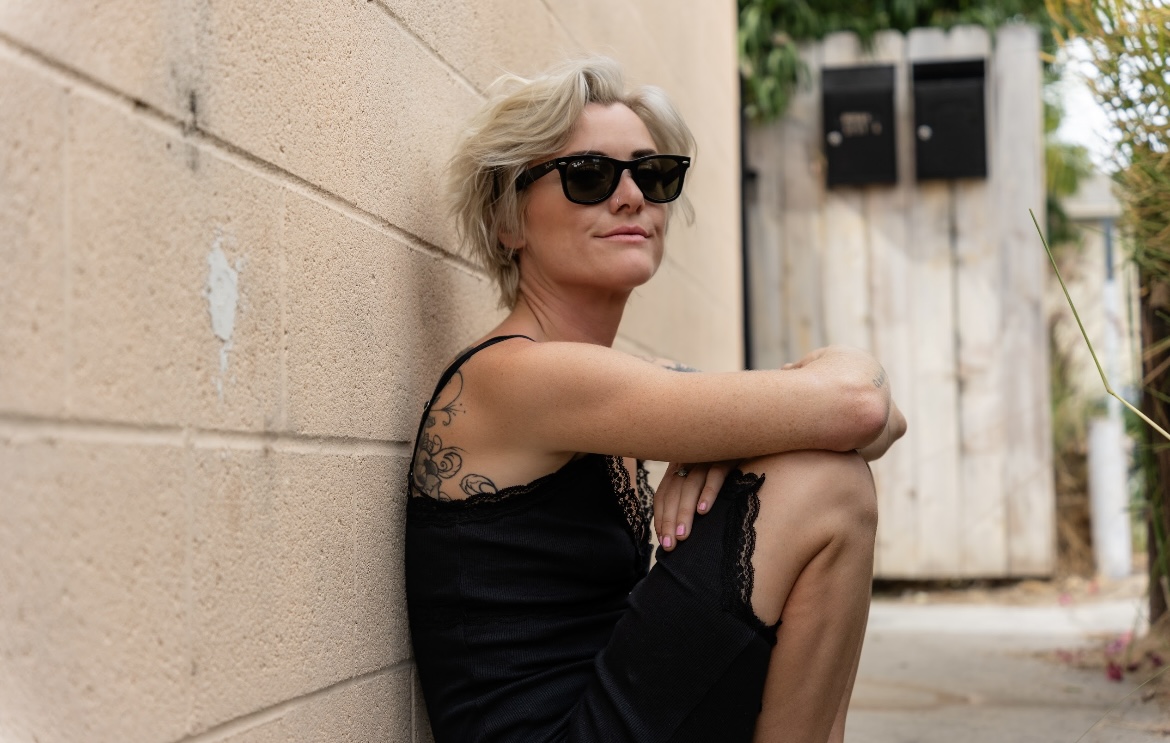
LONG BEACH, Calif. – Emerging from the dynamic music scene of Los Angeles, Juliet Hawkins seamlessly integrates deeply soulful vocals with contemporary production techniques, crafting a distinctive sound that defies conventional categorization.
Drawing inspiration from the emotive depth of Amy Winehouse and weaving together elements of country, blues, and pop, Hawkins’ music can best be described as a fusion–perhaps best termed as soulful electronica. Yet, even this characterization falls short, as Hawkins defines herself as “a blend of a million different inspirations.”
Hawkins’s musical palette mirrors her personae: versatile and eclectic. Any conversation with Hawkins makes this point abundantly clear. She exhibits the archetype of a wild, musical genius while remaining true to her nature-loving, creative spirit. Whether recording in the studio for an album release, performing live in a studio setting, or playing in front of a live audience, Hawkins delivers her music with natural grace.
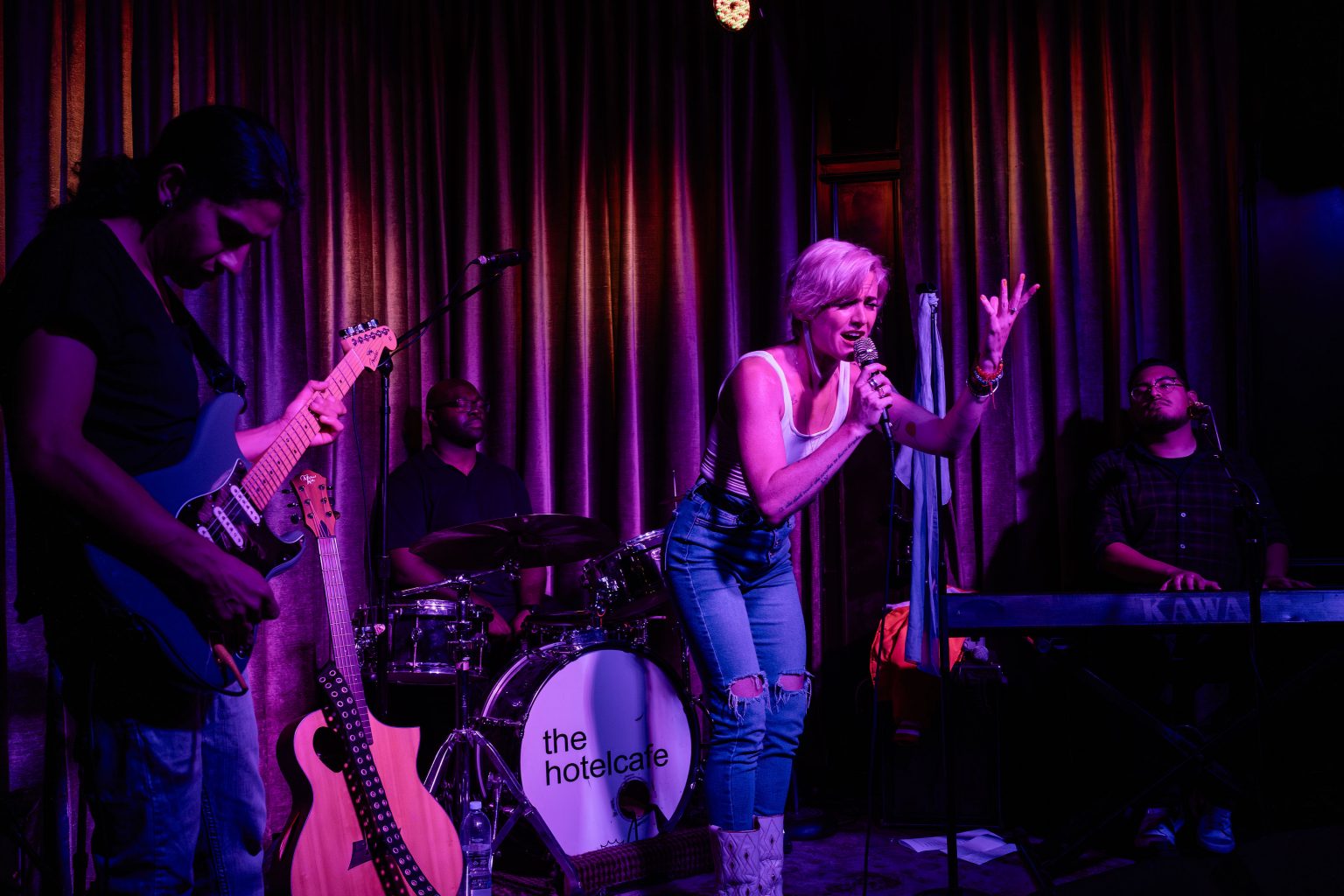
However, Hawkins’s musical journey is far from effortless. Amid personal challenges and adversity, she weaves her personal odyssey of pain and pleasure, transforming these experiences into empowering anthems.
In a candid interview with the Blade, Hawkins spoke with profound openness and vulnerability about her past struggles with opiate and heroin addiction: “That was 10 years ago that I struggled with opiates,” she shared. Yet, instead of letting her previous addiction define her, Hawkins expressed to the Blade that she harbors no shame about her past. “My newer music is much more about empowerment than recovery,” she explained, emphasizing that “writing was the best way to process trauma.”
Despite her struggles with addiction, Hawkins managed to recover. However, she emphasizes that this recovery is deeply intertwined with her spiritual connection to nature. An illustrative instance of Hawkins’ engagement with nature occurred during the COVID pandemic.
Following an impulse that many of us have entertained, she bought a van and chose to live amidst the trees. It was during this period that Hawkins composed the music for her second EP, titled “Lead with Love.”
In many ways, Hawkins deep spiritual connection to nature has been profoundly shaped by her extensive travels. Born in San Diego, spending her formative years in Massachusetts, and later moving to Tennessee before returning to Southern California, she has broadened her interests and exposed herself to the diverse musical landscapes across America.
“Music is the only thing I have left,” Hawkins confides to the Blade, highlighting the integral role that music has in her life. This intimate relationship with music is evident in her sultry and dynamic compositions. Rather than imitating or copying other artists, Hawkins effortlessly integrates sounds from some of her favorite musical influences to create something new. Some of these influences include LP, Lucinda Williams, Lana Del Rey, and, of course, Amy Winehouse, among others.
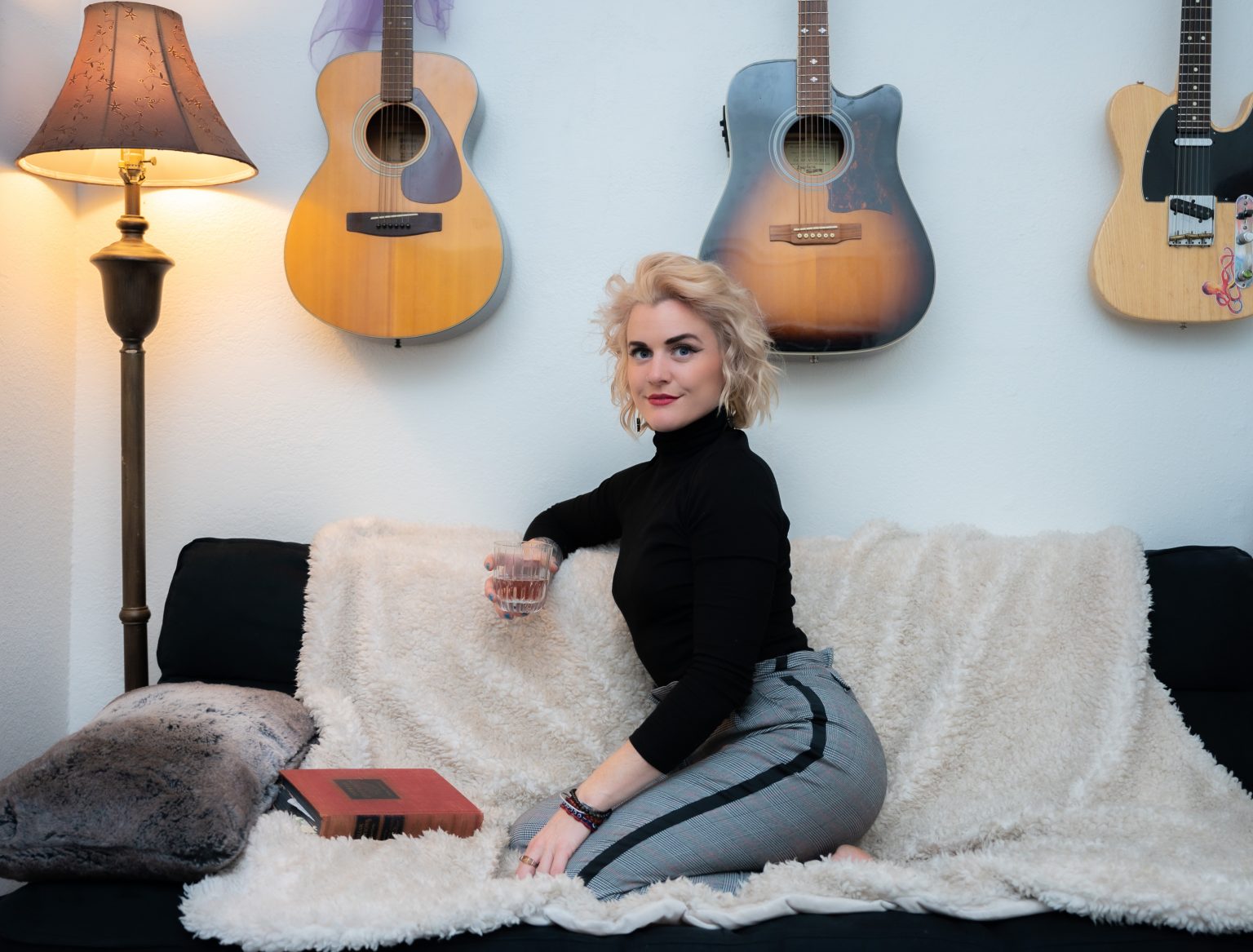
Hawkins has always been passionate about music—-she began with piano at a young age, progressed to guitar, and then to bass, eagerly exploring any instrument she could get her hands on. However, instead of following a traditional path of formalized lessons and structured music theory, Hawkins told the Blade that she “has a hard time following directions and being told what to do.”
This independent approach has led her to experiment with various genres and even join unexpected groups, such as a tribute band for Eric Clapton and Cream. While she acknowledges that her eclectic musical interests might be attributed to ADHD, she holds a different belief: “Creative minds like to move around.”
When discussing her latest musical release — “Stay True (the live album)” which was recorded in a live studio setting — Hawkins describes the experience as a form of improvisation with both herself and the band:
“[The experience] was this divine honey that was flowing through all of us.” She explains that this live album was uncertain in the music’s direction. “For a couple of songs,” Hawkins recalls, “we intuitively closed them out.” By embracing creative spontaneity and refusing to be constrained by fear of mistakes, the live album authentically captures raw sound, complete with background chatter, extended outros, and an extremely somber cover of Ozzy Osbourne’s “Crazy Train” coupled with a slow piano and accompanied strings.
While “Stay True” was a rewarding experience for Hawkins, her favorite live performance took place in an unexpected location—an unattended piano in the middle of an airport. As she began playing Beethoven’s “Moonlight Sonata”, Hawkins shared with the Blade a universal connection we all share with music: “This little girl was dancing as I was playing.”
After the performance, tears welled in Hawkins’ eyes as she was touched by the young girl’s appreciation of her musicianship. Hawkins tells the Blade, “It’s not about playing to an audience—it’s about finding your people.”
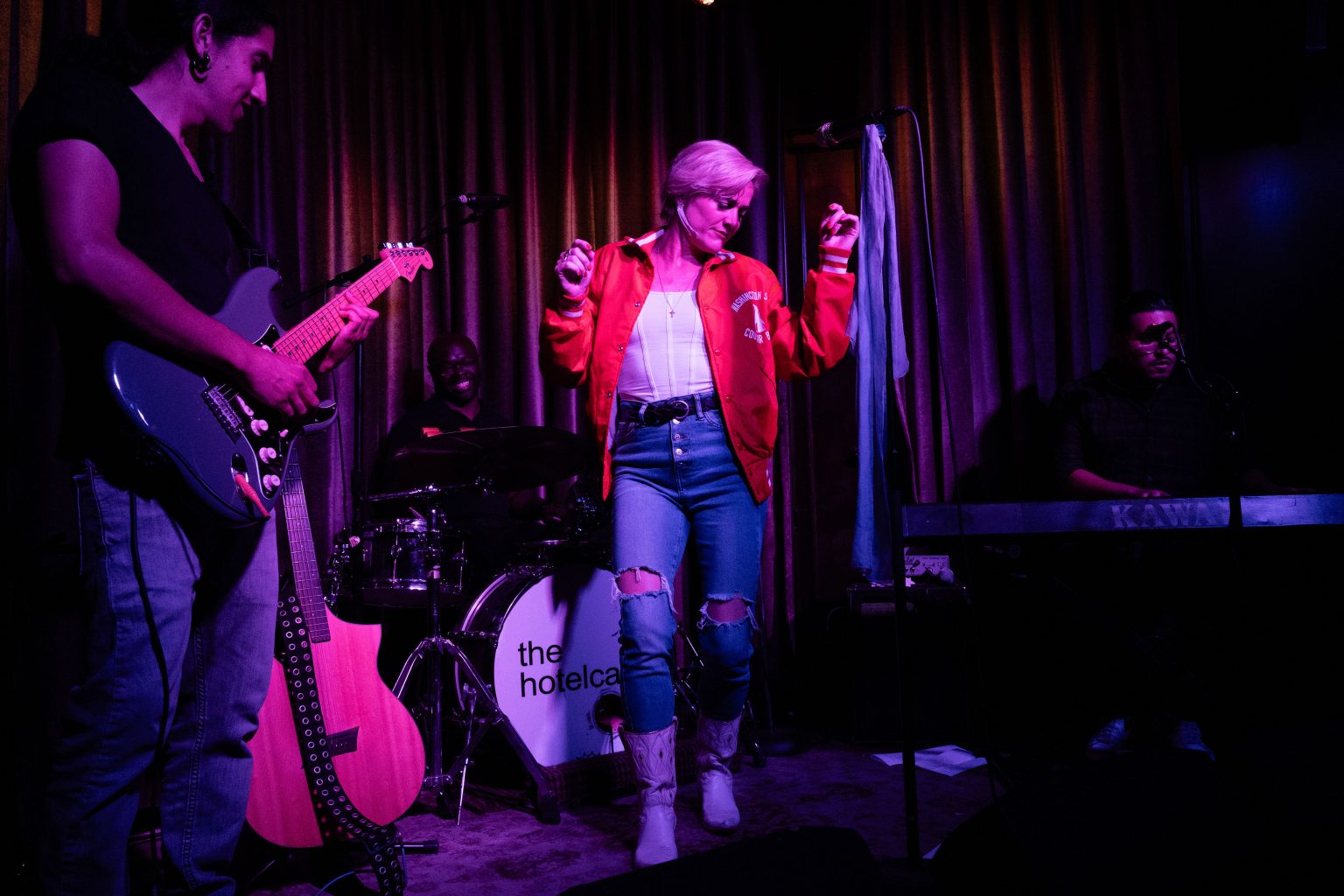
What sets Hawkins apart as an artist is her ability to connect with her audience in diverse settings. She highlights EDC, an electronic dance music festival, as a place where she unabashedly lets her “freak flag” fly and a place to connect with her people. Her affinity for electronic music not only fuels her original pop music creations, but also inspires her to reinterpret songs with an electronic twist. A prime example of this is with her electronic-style cover of Tal Bachman’s 90’s hit, “She’s So High.”
As an openly queer woman in the music industry, Hawkins is on a mission to safeguard artistic integrity. In songs like “My Father’s Men,” she bares her vulnerability and highlights the industry’s misogyny, which often marginalizes gender minorities in their pursuit of artistic expression.
She confides to the Blade, “The industry can be so sexist, misogynist, and oppressive,” and points out that “there are predators in the industry.” Yet, rather than succumbing to apathy, Hawkins is committed to advocating for gender minorities within the music industry.
“Luckily, people are rising up against misogyny, but it’s still there. ‘My Father’s Men’ is a message: It’s time for more people who aren’t just white straight men to have a say.”
Hawkins is also an activist for other causes, with a fervent belief in the preservation of bodily autonomy. Her self-directed music video “I’ll play Daddy,” showcases the joy of embracing one’s body with Hawkins being sensually touched by a plethora of hands. While the song, according to Hawkins, “fell upon deaf ears in the south,” it hasn’t stopped Hawkins from continuing to fight for the causes she believes in. In her interview, Hawkins encapsulated her political stance by quoting an artist she admires:
“To quote Pink, ‘I don’t care about your politics, I care about your kids.’”
When Hawkins isn’t writing music or being a champion for various causes, you might catch her doing the following: camping, rollerblading, painting, teaching music lessons, relaxing with Bernie (her beloved dog), stripping down for artsy photoshoots, or embarking on a quest to find the world’s best hollandaise sauce.
But at the end of the day, Hawkins sums up her main purpose: “To come together with like-minded people and create.”
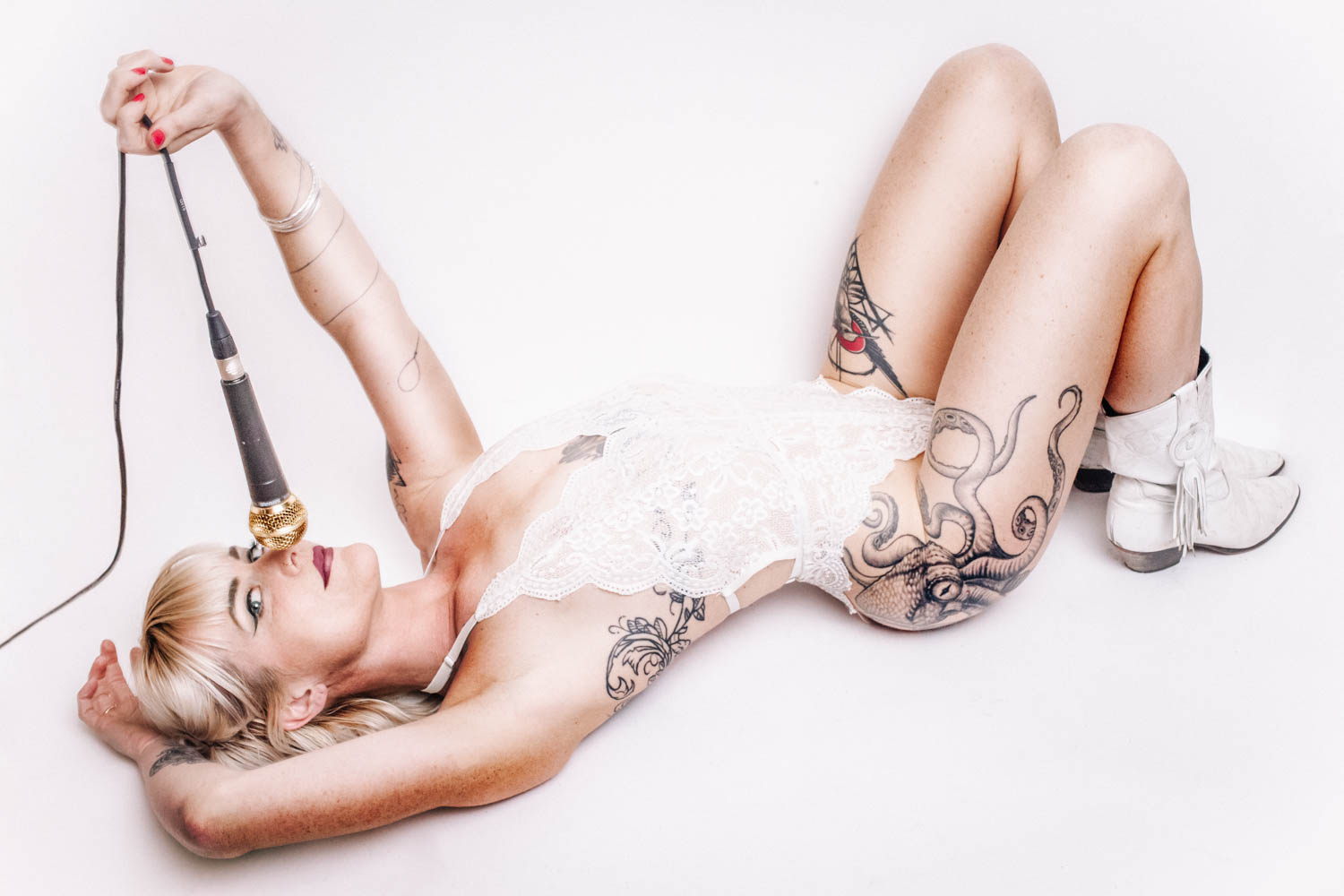
Part of this ever-evolving, coming-of-age-like journey includes an important element: plant-based medicine. Hawkins tells the Blade that she acknowledges her previous experience with addiction and finds certain plants to be useful in her recovery:
“The recovery thing is tricky,” Hawkins explains, “I don’t use opiates—-no powders and no pills—but I am a fan of weed, and I think psilocybin can be helpful when used at the right time.” She emphasizes the role of psychedelics in guiding her towards her purpose. “Thanks for psychedelics, I have a reignited sense of purpose … Music came naturally to me as an outlet to heal.”
While she views the occasional dabbling of psychedelics as a spiritual practice, Hawkins also embraces other rituals, particularly those she performs before and during live shows. “I always carry two rocks with me: a labradorite and a tiger’s eye marble,” she explains.
-

 State Department2 days ago
State Department2 days agoState Department releases annual human rights report
-

 Maryland4 days ago
Maryland4 days agoJoe Vogel campaign holds ‘Big Gay Canvass Kickoff’
-

 Politics3 days ago
Politics3 days agoSmithsonian staff concerned about future of LGBTQ programming amid GOP scrutiny
-

 The White House1 day ago
The White House1 day agoWhite House debuts action plan targeting pollutants in drinking water



